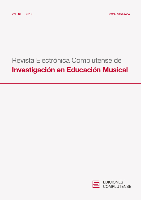
Revista Electronica Complutense de Investigacion en Educacion Musical-RECIEM
Scope & Guideline
Fostering Collaboration in the World of Music Research
Introduction
Aims and Scopes
- Music Education Research:
The journal publishes research that explores various aspects of music education, including curriculum development, teaching methodologies, and the role of music in early childhood and higher education. - Interdisciplinary Approaches:
RECIEM embraces interdisciplinary research, integrating insights from psychology, sociology, and technology to enhance music education practices and understand their broader societal impacts. - Inclusivity and Accessibility:
A significant focus is placed on inclusive music education, examining strategies to engage diverse learner populations, including students with special needs and those from marginalized communities. - Community and Cultural Engagement:
The journal highlights community-oriented music projects and cultural heritage initiatives, emphasizing the importance of music in fostering social cohesion and cultural identity. - Technological Integration:
Research on the integration of technology in music education is a core area, examining how digital tools can enhance teaching and learning experiences.
Trending and Emerging
- Early Childhood Music Education:
A surge in research related to music education for young children highlights its importance in fostering cognitive and social development, particularly in inclusive settings. - Music and Mental Health:
Growing interest in the therapeutic aspects of music education, particularly concerning mental health and well-being, underscores the role of music in emotional and psychological development. - Computational Thinking and Music:
The integration of computational thinking through music activities is an emerging theme, reflecting the increasing relevance of digital literacy in music education. - Community Music Initiatives:
There is an increasing focus on community-based music projects, emphasizing the role of music in social inclusion and community development. - Innovative Assessment Practices:
Research into creative and formative assessment approaches in music education is gaining traction, indicating a shift towards more holistic evaluation methods.
Declining or Waning
- Traditional Pedagogical Techniques:
There has been a noticeable decrease in research focused on traditional music teaching methods, as newer, more innovative pedagogical approaches gain prominence. - Performance-Centric Education:
Research centered mainly on performance skills and techniques is less frequent, indicating a shift towards broader educational outcomes and the holistic development of students. - Musicology as a Standalone Discipline:
The journal has less emphasis on pure musicology studies, reflecting a trend towards integrating musicological insights within educational contexts rather than treating them as isolated subjects. - Focus on Classical Music:
There appears to be a waning interest in classical music education, with a growing preference for exploring various musical genres and contemporary practices. - Teacher Training in Traditional Contexts:
Research specifically addressing traditional teacher training models is declining, as there is a move towards more dynamic and adaptive training frameworks that respond to current educational challenges.
Similar Journals
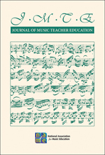
Journal of Music Teacher Education
Navigating the Evolving Landscape of Music Education.The Journal of Music Teacher Education, published by SAGE Publications Inc, is a leading scholarly outlet dedicated to advancing the field of music education. With an ISSN of 1057-0837 and an E-ISSN of 1945-0079, this journal explores a wide array of topics pertinent to music teaching and learning, serving as a vital resource for both researchers and practitioners in the music education community. Since its inception in 1991, it has consistently been positioned among the top-tier journals in both music and education, achieving a notable Q1 ranking in music and Q2 in education as of 2023. With impressive Scopus rankings, placing it in the 89th percentile for music and 47th percentile for education, the journal plays a crucial role in facilitating dialogue and disseminating innovative research aimed at improving music pedagogy. While not an open-access publication, it provides access to invaluable insights and practices that inform both theory and application in music education, making it an essential read for educators, students, and researchers alike, as they navigate the evolving landscape of music teaching. Explore the latest findings and thought-provoking discussions that shape the future of music education in the United States and beyond.
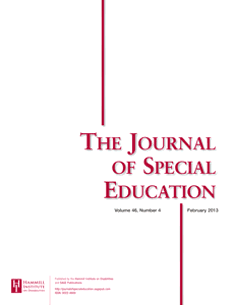
JOURNAL OF SPECIAL EDUCATION
Advancing inclusive education for all learners.The JOURNAL OF SPECIAL EDUCATION, published by SAGE PUBLICATIONS INC, is a leading academic journal in the fields of education and rehabilitation, dedicated to advancing knowledge and research practices for individuals with disabilities. Established in 1966 and converging into a rich legacy of scholarship, the journal is esteemed for its rigorous peer-reviewed articles, boasting a top-tier Q1 ranking in both the Education and Rehabilitation categories. With a commendable impact, it ranks #36 out of 161 in Medicine Rehabilitation and #349 out of 1543 in Social Sciences Education, placing it in the 77th percentile in both contexts. The journal serves as a vital platform for educators, researchers, and practitioners to disseminate innovative studies and methodologies that profoundly influence special education practices. While not open access, its contributions are pivotal for advancing inclusive educational strategies and fostering greater understanding of diverse learning needs. For those engaged in special education research, the JOURNAL OF SPECIAL EDUCATION is an essential resource for current trends, theories, and practices shaping the future of the field.
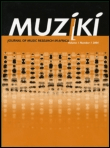
Muziki-Journal of Music Research in Africa
Advancing Scholarship in African MusicologyMuziki - Journal of Music Research in Africa is a leading publication dedicated to exploring the rich tapestry of music research across the African continent. Published by Routledge Journals, Taylor & Francis Ltd, this journal has been at the forefront of scholarly discourse since its inception in 2004, providing a platform for innovative and interdisciplinary approaches to the study of music. With an ISSN of 1812-5980 and E-ISSN of 1753-593X, it ensures wide accessibility to both print and digital audiences. As of 2023, it holds a prestigious Q3 ranking in the field of Music, reflecting its commitment to quality scholarship and the promotion of diverse musical narratives. Muziki is particularly invaluable for researchers, professionals, and students seeking to deepen their understanding of African musicology and its socio-cultural relevance. The journal publishes original research articles, reviews, and critical essays, highlighting contemporary developments and historical contexts in music research. With a Scopus rank of 59/180 in the Arts and Humanities Music category, it stands as a respected source for advancing knowledge and fostering dialogue within the global music community.

Musica Hodie
Advancing Critical Insights into Musical Theory and PracticeMusica Hodie is a pivotal academic journal published by the Universidade Federal de Goiás, Brazil, focusing on the field of music. The journal, with ISSN 1676-3939 and E-ISSN 2317-6776, serves as a vital platform for scholars, professionals, and students to disseminate innovative research findings and critical analyses related to music theory, history, and practice. With a prestigious Q2 ranking in the Music category and a Scopus rank of 103/180, the journal significantly contributes to the cultural and academic landscape of music studies in Brazil and beyond, covering converged years from 2010 to 2016 and also from 2018 to 2023. Although it operates under a subscription model, the journal remains committed to fostering open dialogue and knowledge sharing in the arts and humanities. As researchers delve into the intricacies of music, Musica Hodie stands out as a key resource for advancing scholarly discourse and enhancing the understanding of music’s multifaceted role in society.

BULLETIN OF THE COUNCIL FOR RESEARCH IN MUSIC EDUCATION
Fostering Scholarly Inquiry in Music EducationBULLETIN OF THE COUNCIL FOR RESEARCH IN MUSIC EDUCATION, published by UNIV ILLINOIS PRESS, is a premier scholarly journal dedicated to advancing the field of music education through rigorous research and critical discourse. With an ISSN of 0010-9894 and E-ISSN 2162-7223, this journal plays a significant role in disseminating innovative findings and educational practices, ranking in Q1 for Music and Q2 for Education as of 2023. The journal's esteemed position is further highlighted by its Scopus ranking, placing it in the 80th percentile among music-related publications. Covering a time span from 2002 to 2024, it serves as a vital resource for educators, researchers, and graduate students alike. Although the journal does not currently offer open access, its contributions remain crucial in shaping music education research and practice. The BULLETIN not only inspires scholarly inquiry but also enhances the discourse surrounding effective music education methodologies.
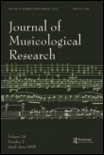
JOURNAL OF MUSICOLOGICAL RESEARCH
Celebrating the Intersection of Music and AcademiaJOURNAL OF MUSICOLOGICAL RESEARCH, published by Taylor & Francis Ltd, is an esteemed platform that delves into the field of musicology, contributing to the ongoing dialogue in music research and scholarship since its establishment in 1979. With an ISSN of 0141-1896 and an E-ISSN of 1547-7304, this journal serves as a vital resource for researchers, professionals, and students, offering insights into diverse musicological topics. Although currently categorized in Q4 in Music with Scopus rankings placing it at #110 out of 180 in the Arts and Humanities field, its commitment to excellence and broader discourses in music studies is evident. The journal does not have Open Access options, yet it provides accessible content through reputable academic channels, fostering scholarly exchanges within the community. It aims to publish high-quality research that advances understanding of musical practices and cultural implications, making it a critical resource for those passionate about music and its myriad influences.
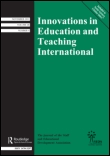
INNOVATIONS IN EDUCATION AND TEACHING INTERNATIONAL
Transforming teaching with cutting-edge methodologies.INNOVATIONS IN EDUCATION AND TEACHING INTERNATIONAL, published by Routledge Journals, Taylor & Francis Ltd, is a premier, peer-reviewed journal dedicated to disseminating cutting-edge research and best practices in the field of education. With an impressive Q1 category ranking in Education, this journal is recognized for its influential contributions, boasting a Scopus Rank of #288 out of 1543 in Social Sciences – Education, placing it in the 81st percentile of its category. Established in 1996 and continuing to thrive through 2024, INNOVATIONS IN EDUCATION AND TEACHING INTERNATIONAL focuses on fostering scholarly discourse around emerging educational methodologies, pedagogical innovations, and the integration of technology in teaching. As an open-access journal, it ensures that groundbreaking research is accessible to a global audience, empowering educators, researchers, and policy-makers to enhance teaching and learning experiences. By publishing high-quality, empirical studies and theoretical contributions, this journal plays a vital role in shaping the future of education.
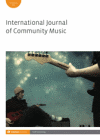
International Journal of Community Music
Exploring the Transformative Power of Music in CommunitiesThe International Journal of Community Music, published by INTELLECT LTD, stands at the forefront of interdisciplinary research in the field of community music. With an ISSN of 1752-6299 and an E-ISSN of 1752-6302, this esteemed journal has made significant contributions to the understanding of music as a vehicle for social inclusion, cultural expression, and community building since its inception in 2008. Operating from the United Kingdom, the journal is well-regarded within the academic community, boasting a Q1 ranking in Music and a commendable 85th percentile position in the Scopus Arts and Humanities category. The journal provides a platform for innovative research, case studies, and critical discussions that explore the dynamic relationships between music and community engagement. With a focus on fostering new knowledge and practices, the International Journal of Community Music serves as an essential resource for researchers, practitioners, and students who are passionate about the transformative power of music in society.
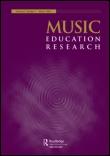
Music Education Research
Shaping the Landscape of Music EducationMusic Education Research is a prestigious journal dedicated to advancing scholarship in the field of music education, published by Routledge Journals, Taylor & Francis Ltd. With a significant impact factor reflected in its Q1 ranking in Music and Q2 in Education for 2023, this journal is a critical resource for researchers, educators, and practitioners alike. It consistently ranks high in both the Arts and Humanities and Social Sciences categories, with an impressive position of Rank #8 in Music out of 180 journals, indicating its influence in shaping contemporary discourse. Aimed at fostering innovation and critical examination within music education, Music Education Research invites submissions that explore a broad spectrum of topics, encompassing pedagogical practices, policy implications, and curriculum development. Operating from the United Kingdom, the journal provides a vital platform for sharing cutting-edge research and is committed to improving music learning experiences across various educational contexts.

Opus
Advancing Knowledge in MusicologyOpus is an esteemed open-access journal published by the Associação Nacional de Pesquisa e Pós-Graduação em Música in Brazil, focusing on the field of music studies. With an ISSN of 1517-7017, Opus has been dedicated to fostering innovative research since its inception and has embraced the open-access model since 2009, ensuring that its findings are readily accessible to scholars and enthusiasts globally. The journal has achieved a commendable Q2 ranking in Music as of 2023, showcasing its impact and relevance within the arts and humanities. Although currently ranked #130 out of 180 in Scopus in the music category, Opus maintains a commitment to enhancing the scholarly discourse in musicology through empirical studies, theoretical analyses, and interdisciplinary approaches. The journal's convergence over the years, from 2017 to 2024, reflects its dedication to evolving educational and research methodologies in music. Situated in the vibrant academic landscape of Campinas, SP, Brazil, Opus invites researchers, professionals, and students to contribute to its mission of exploring the multifaceted dimensions of music.